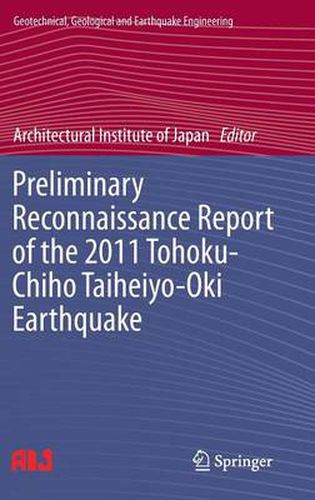Readings Newsletter
Become a Readings Member to make your shopping experience even easier.
Sign in or sign up for free!
You’re not far away from qualifying for FREE standard shipping within Australia
You’ve qualified for FREE standard shipping within Australia
The cart is loading…






This title is printed to order. This book may have been self-published. If so, we cannot guarantee the quality of the content. In the main most books will have gone through the editing process however some may not. We therefore suggest that you be aware of this before ordering this book. If in doubt check either the author or publisher’s details as we are unable to accept any returns unless they are faulty. Please contact us if you have any questions.
Devastating damage in the Tohoku region of Japan occurred during and after the earthquake off the Pacific coast of Tohoku earthquake on March 11, 2011. The AIJ (Architectural Institute of Japan) dispatched reconnaissance teams into the field to obtain basic facts on the damage to buildings due to the massive ground motions and resultant tsunami. Their mission included collecting information on the characteristics of the earthquake itself and the observed major ground motions and tsunamis throughout the area. For the structural damage investigation, buildings are classified by their type of construction, namely, steel buildings, reinforced concrete buildings, wooden houses, etc. along with descriptions of special features for each category of building type. The report summarizes damage associated with ground failures including landslide and liquefaction as well as non-structural damages such as to equipment and facilities, partitioning walls and ceilings, and functional failures in skyscrapers. Also brief description of the Japanese Seismic Design Code will be provided in the Appendix. A proposed scheme of anti-tsunami design for buildings is also included.
$9.00 standard shipping within Australia
FREE standard shipping within Australia for orders over $100.00
Express & International shipping calculated at checkout
This title is printed to order. This book may have been self-published. If so, we cannot guarantee the quality of the content. In the main most books will have gone through the editing process however some may not. We therefore suggest that you be aware of this before ordering this book. If in doubt check either the author or publisher’s details as we are unable to accept any returns unless they are faulty. Please contact us if you have any questions.
Devastating damage in the Tohoku region of Japan occurred during and after the earthquake off the Pacific coast of Tohoku earthquake on March 11, 2011. The AIJ (Architectural Institute of Japan) dispatched reconnaissance teams into the field to obtain basic facts on the damage to buildings due to the massive ground motions and resultant tsunami. Their mission included collecting information on the characteristics of the earthquake itself and the observed major ground motions and tsunamis throughout the area. For the structural damage investigation, buildings are classified by their type of construction, namely, steel buildings, reinforced concrete buildings, wooden houses, etc. along with descriptions of special features for each category of building type. The report summarizes damage associated with ground failures including landslide and liquefaction as well as non-structural damages such as to equipment and facilities, partitioning walls and ceilings, and functional failures in skyscrapers. Also brief description of the Japanese Seismic Design Code will be provided in the Appendix. A proposed scheme of anti-tsunami design for buildings is also included.